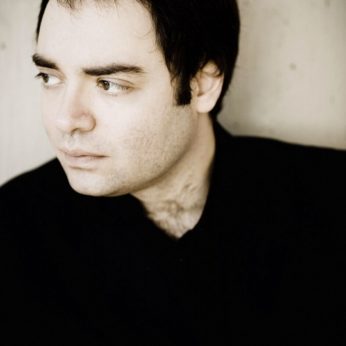Composer: Rodion Shchedrin (b. 1932)
Performance date: 02/07/2015
Venue: Bantry Library
Composition Year: 1999
Duration: 00:20:49
Recording Engineer: Richard McCullough, RTÉ lyric fm
Instrumentation Category:Duo
Artists:
Alexander Melnikov -
[piano]
Dmitri Sitovetsky -
[violin]

Rodion
Shchedrin claims to have been an outsider for much of his life. As a
consequence, there is little to be found written about his music in terms of
analyses or in-depth explanations of his compositional and technical approach.
Yet he carries world fame – his ingenious adaptation of George Bizet’s Carmen
in the Carmen Suite, written for his
wife, the ballet superstar Maya
Plisetskaya, is played all over the world. The red-headed and headstrong
Plisetskaya was the glory of the Bolshoi Ballet in the Soviet era and Shchedrin
wrote several ballets for her using classical Russian texts by Tolstoy and
Chekov. She died earlier this year at the age of 89.
Operas also
take up a good portion of his opus list, alongside with chamber music and
concertos for a great variety of solo instruments. His opera, Lolita, after
Nabokov’s novel had its first performance in Stockholm in 1994, was the third
of seven operas. Shchedrin is renowned for his black humour, particularly
evident in his settings of the satirical works of Nikolai Leskov.
His music
often displays a complex weave of elements: Russian folklore and traditional
stylistic means share the sound space with modern compositional methods such as
collage and aleatoric techniques. But his main focus is not
the techniques used: the musical coherence, the dramaturgy, the sound of the
instruments and, of course, the musicians constitute the pivot point of his
musical universe. In an article published in the New York Times (February
2011), Shchedrin claims that of most concern to him was that the musicians generate heat. He wants his work to grab the audience and
not let go until the end:
The audience gives you the first two minutes of its
attention for free, he said. Then, if they are not interested, they start
to think about tomorrow, about an appointment with the dentist, with the
orthopaedist, about a business lunch.
When Sir
Yehudi Menuhin, the famous violinist and conductor, died in March 1999, the
Gstaad Festival commissioned Shchedrin to write the Menuhin-Sonata as a memorial to the great musician. Dmitry
Sitkovetsky and Michel Dalberto premiered the piece in Saanen – a musical
homage and tribute to one of the most influential musical personalities of the
20th century.
The sonata,
shaped in a single movement, is no cold emulation of the artistry of Yehudi
Menuhin. The violin begins the sonata with a plaintive motif, soon joined by
the piano in a pointillist downward movement. But the sonata is rather about ascending – a journey full of longing
and musical metaphors for life and death. There are discrete unison calls as
well as dramatic culminations in this dense texture, as if Shchedrin wants to
depict a life led to the fullest. But, below the surface dwell secrets and
mystical musical relations – maybe even coded references that cannot be
deciphered directly. Instead these elements form a kind of emotional backdrop,
a counterpoint to what is actually being played.
Copyright © 2025 West Cork Music. All rights reserved.
Designed and developed by Matrix Internet